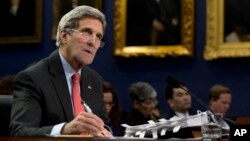Initial Obama administration pleas that U.S. lawmakers set aside legislation giving them a say on a final Iran nuclear accord appear to be falling on mostly deaf ears in the Republican-led Congress.
“It serves our security better when Congress is involved, and if they are involved now, I think that is helpful,” said Republican Congressman Chris Stewart late Monday.
Stewart, who sits on the House Intelligence Committee, spoke after he and scores of other representatives emerged from a closed-door meeting with Secretary of State John Kerry, Treasury Secretary Jack Lew and Energy Secretary Ernest Moniz - all dispatched by President Barack Obama to urge congressional restraint.
Fellow Republican Dana Rohrabacher was even more outspoken, characterizing negotiations with Iran as well-meaning but misguided.
“It is the [Iranian] mullah regime that is the threat, and as long as you have these radical mullahs in Iran who believe in destroying Western civilization, they will be able to get their hands on a nuclear weapon,” he said.
Rohrabacher said what is needed in Iran is “regime change” - a possibility he said the administration is “writing off” by pursuing nuclear talks.
It is not just Republicans who say Congress cannot be silent on a potential accord of such importance and magnitude.
Democratic Representative Steve Israel said he is taking a wait-and-see approach to any final nuclear deal, but added, “Congress ought to be able to vote. Congress has not just the right, but the responsibility, to approve or disapprove this deal when it is submitted.”
Even before a landmark framework nuclear accord was announced in Switzerland, the chairman of the Senate Foreign Relations Committee, Republican Bob Corker, drafted a bill that would restrict the president’s ability to lift sanctions on Iran for 60 days, giving Congress time to approve or reject a final accord on Iran’s atomic activities.
The deadline for such a deal is June.
Obama wants Congress to hold off on the bill, or modify it so as not to roil delicate international negotiations.
Before speaking with House members, Kerry told reporters, “We have two-and-a-half months more to negotiate. That is a serious amount of time, with some serious business still to do. We hope Congress will listen carefully, and ask the questions it wants, but also give us the space and the time to be able to complete a very difficult task which has high stakes for our country.”
The Kerry-led team was to meet with senators early Tuesday before the Foreign Relations Committee begins work on the Corker bill, which currently has enough support to pass both houses of Congress.
House Republicans say they have the votes to override a veto threatened by Obama. At present it is not known whether enough Senate Democrats would join with Republicans to do the same. Unless both chambers vote to override, the veto would be sustained.
Although many lawmakers of both parties are skeptical of a nuclear accord, the skepticism is not universal.
Democratic Congressman Jim McGovern emerged from the briefing saying, “I have no reservations. I think it’s a good deal.”
